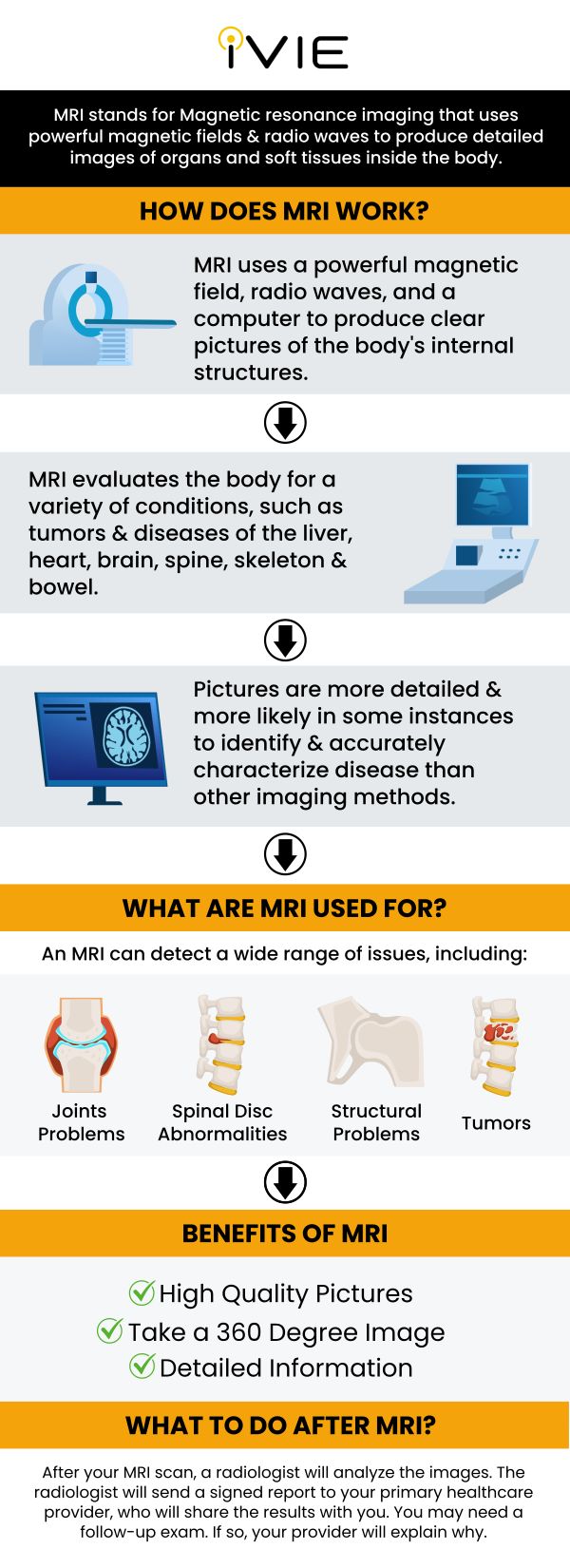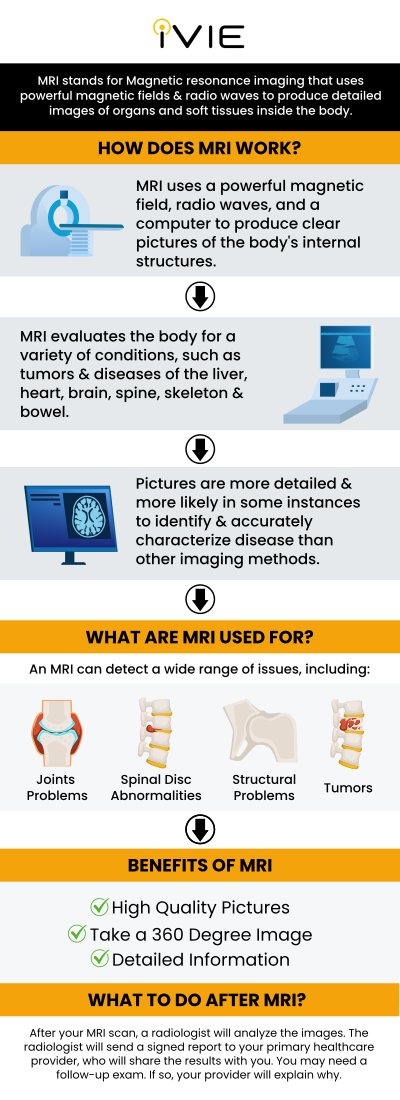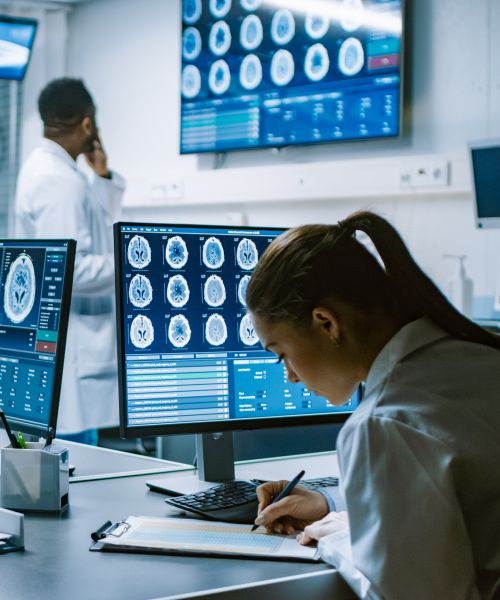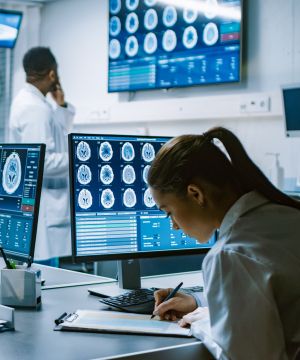Identifying Widespread Bone Abnormalities with Full Body MRI
Discover hidden bone abnormalities with a full-body MRI at iVIE MRI Screening Center in Culver City, CA. Led by Dr. Kourosh Naini, this advanced scan can detect fractures, tumors, and degenerative bone conditions early, empowering you to take control of your health with precision and confidence. For more information, contact us today or book an appointment online. We are located at 11600 Washington Pl Suite 104A, Culver City, CA 90066.


Table of Contents:
What bone conditions can a full-body MRI detect?
How does MRI differ from X-ray or bone scans for bone diseases?
Can a full-body MRI find early signs of osteoporosis or osteomalacia?
Does a full-body MRI help in diagnosing bone cancer?
Why Choose IVIE Culver City for Full Body MRI Scans?
We’re committed to providing advanced diagnostic imaging to support your health and well-being. One of the powerful tools we offer is the full-body MRI, an imaging technique that allows our experienced physicians to detect a wide range of bone conditions with remarkable precision.
A full-body MRI at IVIE delivers highly detailed images of your bones, joints, and surrounding soft tissues. This technology is invaluable for identifying bone tumors—both benign and malignant—by allowing our team to assess the size, location, and any potential spread of abnormal growths. It also plays a critical role in detecting bone metastases, helping us identify secondary cancerous lesions that may have spread to the bones from other parts of your body.
Our full-body MRI services are also designed to uncover bone marrow abnormalities—such as those seen in leukemia, lymphoma, or multiple myeloma—by highlighting changes in the marrow’s composition. We can also detect osteomyelitis (a bone infection) by visualizing inflammation or abscess formation, which is crucial for timely and effective treatment.
Unlike standard X-rays, our full-body MRI can reveal subtle bone injuries, such as stress fractures or hairline fractures, that might otherwise go unnoticed. This technology is also highly effective in diagnosing conditions like avascular necrosis (bone tissue death due to lack of blood supply) and various forms of arthritis, including osteoarthritis and rheumatoid arthritis, by showing detailed changes in bone and joint structures.
Our state-of-the-art MRI technology uses powerful magnetic fields and radio waves to generate highly detailed images of your bones and surrounding soft tissues—without the use of ionizing radiation. MRI is especially valuable for evaluating complex musculoskeletal conditions, such as early bone marrow changes, subtle fractures, infections, tumors, and soft tissue injuries involving ligaments, tendons, and cartilage. At IVIE, our specialists often recommend an MRI for patients with persistent or unexplained joint pain, sports injuries, or suspected soft tissue damage that may not be visible on other imaging studies.
X-rays remain a cornerstone in orthopedic diagnosis. They are excellent for quickly and efficiently assessing bone structure, alignment, and detecting fractures, advanced arthritis, or gross bone abnormalities. Our digital X-ray technology offers clear, immediate images, allowing our physicians to evaluate injuries and conditions right at your visit. While X-rays are ideal for many bone concerns, they are less sensitive in revealing early-stage disease or soft tissue issues, which is why our team may recommend additional imaging when necessary.
For conditions where increased bone activity is suspected—such as hidden fractures, bone infections, or the spread of certain cancers— we offer bone scans. This advanced technique uses a small amount of safe, radioactive tracer to highlight areas of increased bone turnover. Bone scans are incredibly sensitive for detecting problems that are not yet visible on X-ray, making them valuable in the early diagnosis of many musculoskeletal conditions. However, because bone scans provide less anatomical detail, our physicians often use them in conjunction with other imaging for the most accurate assessment.
We understand that every patient and every injury is unique. That’s why our experienced team carefully selects the most appropriate imaging modality—MRI, X-ray, or bone scan—based on your specific symptoms and clinical needs. By leveraging the strengths of each technique, we ensure that you receive a thorough evaluation and a personalized approach to your bone and joint health.
Osteoporosis is a condition where bone mass decreases and bone tissue deteriorates, increasing the risk of fractures. Osteomalacia involves the softening of bones, often due to vitamin D deficiency or related metabolic issues. Both conditions primarily impact the mineral content and structure of bones.
While MRI scans excel at visualizing soft tissue and certain bone abnormalities—such as fractures, tumors, or bone marrow changes—they are not sensitive enough to detect the early loss of bone mineral density, which is the main concern in osteoporosis. MRI may occasionally reveal changes seen in osteomalacia at more advanced stages, but these signs often appear later in the course of the disease.
We follow evidence-based guidelines for bone health assessment. The gold standard for diagnosing osteoporosis is the bone mineral density (BMD) test, typically performed using Dual-energy X-ray Absorptiometry (DEXA or DXA). This test directly measures bone density and can identify osteoporosis or osteopenia before fractures occur. For osteomalacia, diagnosis may involve blood work to check vitamin D, calcium, phosphate, and alkaline phosphatase levels, as well as X-rays to detect subtle bone changes. MRI may be used in select cases, such as when there’s unexplained bone pain or suspected complications, but it is not a first-line screening tool.
MRI (magnetic resonance imaging) provides exceptionally detailed images of bones, soft tissues, and bone marrow. This level of detail is especially valuable for detecting bone tumors, evaluating their size, and determining if the cancer has extended into nearby tissues or other areas of the body. In certain situations—such as for patients considered high risk or those already diagnosed with bone cancer—a full-body MRI may be recommended to check for possible metastasis.
However, it’s important to note that a full-body MRI is not always the first imaging study performed when bone cancer is suspected. Our team follows best-practice guidelines, which typically start with a simple X-ray. If abnormalities are found, we may then suggest more advanced imaging like MRI, CT scans, or bone scans to further characterize the lesion and help guide your care. MRI is particularly valuable in mapping out the local extent of a tumor and its relationship to surrounding structures—vital information for surgical planning.
At IVIE Culver City, Dr. Kourosh Naini offers advanced Full Body MRI scans to help identify widespread bone abnormalities. This non-invasive imaging technique provides a comprehensive view of your skeletal system, allowing Dr. Naini to detect any potential issues such as fractures, degenerative conditions, or bone infections. By using cutting-edge technology, Dr. Naini ensures a detailed and accurate diagnosis, helping you take proactive steps toward better bone health.
Opting for a Full Body MRI at IVIE Culver City means receiving expert care from Dr. Kourosh Naini, who is committed to identifying bone abnormalities with precision and efficiency. Dr. Naini takes the time to explain the process and discuss the results, ensuring you fully understand your condition. With a focus on early detection and personalized care, IVIE Culver City is your trusted partner in maintaining optimal bone health.
While full-body MRI is a powerful tool, it is just one part of a comprehensive diagnostic process. Dr Kourosh will determine the most appropriate imaging and diagnostic pathway for your unique situation, which may also include other studies and, if needed, a biopsy to confirm the diagnosis. For more information, contact us today or book an appointment online. We are located at 11600 Washington Pl Suite 104A, Culver City, CA 90066. We serve patients from Culver City Los Angeles CA, Downtown LA, Beverly Hills CA, Marina del Rey CA, Venice CA, Santa Monica CA, and surrounding areas.
Check Out Our 5 Star Reviews



Additional Services You May Need
▸ Dementia Screening
▸ Aneurysm Screening
▸ Spine MRI
▸ Whole Body MRI Screening
▸ MRI Brain Screening
▸ Brain PET
▸ Work/Sport Spine Injury Diagnosis
▸ Work/Sport Brain Injury Diagnosis
▸ Whole Body PET For Cancer
▸ MRA Brain Screening


